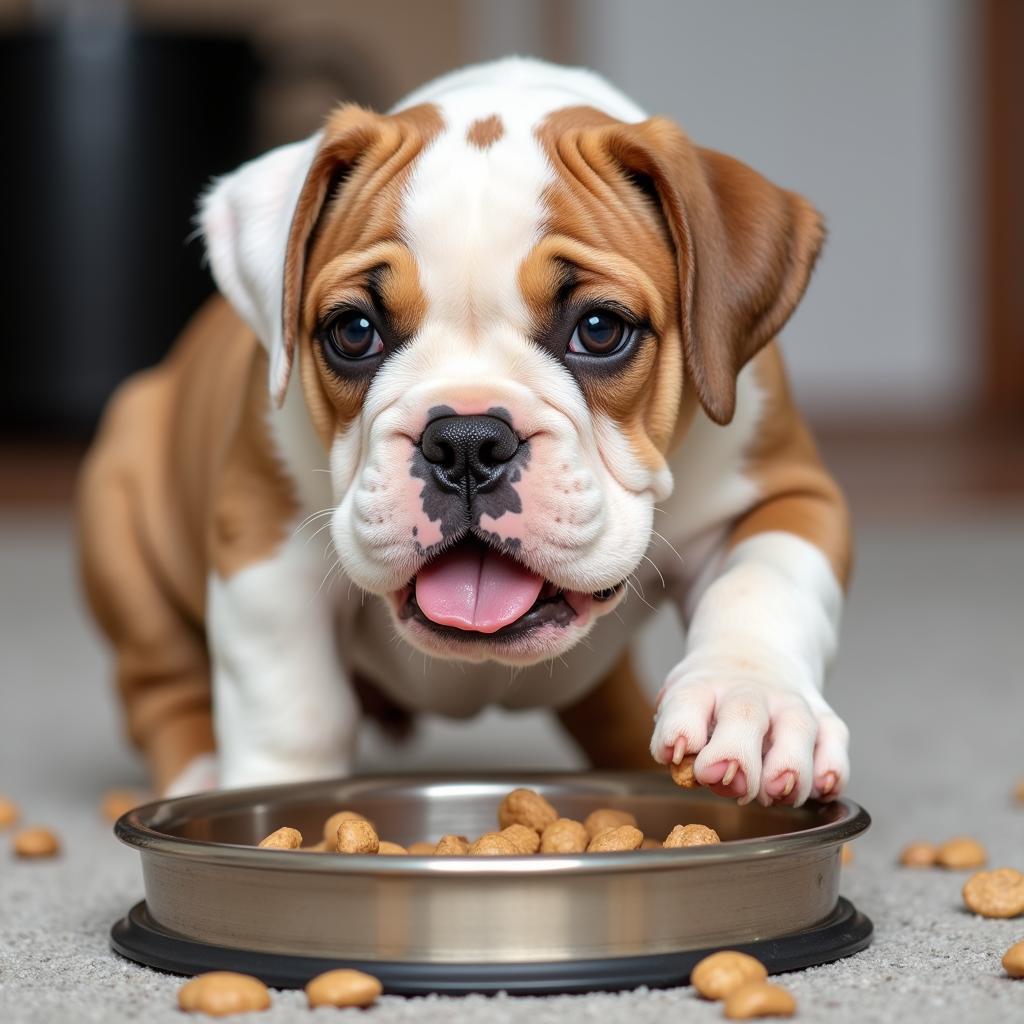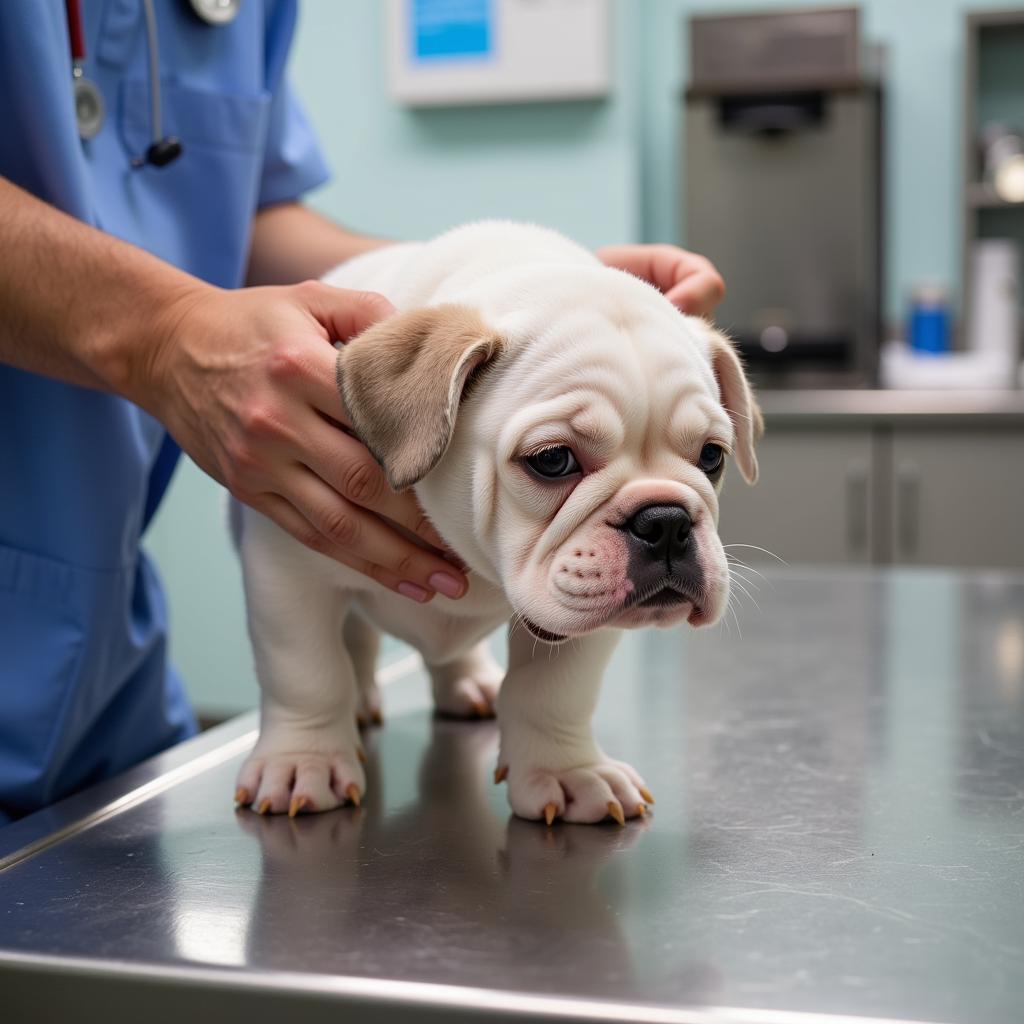Finding the best food for an English Bulldog puppy is crucial for their growth and development. A proper diet sets the stage for a healthy, happy life, minimizing potential health issues these adorable wrinkly pups can be prone to. In the first few months, choosing the right nutrition is paramount. Let’s explore what constitutes the optimal diet for your English Bulldog pup.
What Makes English Bulldogs Unique?
English Bulldogs have specific dietary needs due to their brachycephalic (short-nosed) breed characteristics and their predisposition to certain health problems like allergies, hip dysplasia, and skin issues. Their unique build can make eating from some bowls a challenge, so choosing the right food and the right bowl goes hand-in-hand. A balanced diet tailored to their needs can help mitigate these risks and ensure they thrive. Choosing the right food early on can prevent issues later. Want to learn more about suitable food bowls? Check out the best food bowl for bulldogs.
Key Nutritional Needs for a Bulldog Pup
Protein Powerhouse
Protein is the building block for muscle development, which is essential for a strong and healthy bulldog. Look for puppy food with high-quality animal protein sources like chicken, beef, or lamb. Avoid fillers and by-products. A good rule of thumb is to look for a minimum of 22% protein in puppy food.
Fat for Energy and Coat Health
Healthy fats are essential for energy, brain development, and a glossy coat. Sources like fish oil (rich in omega-3 fatty acids) are particularly beneficial for skin and joint health, often a concern for bulldogs. Aim for a fat content of around 12-18% in their food.
Calcium and Phosphorus for Strong Bones
Calcium and phosphorus are critical for bone development, especially important during a puppy’s rapid growth phase. However, the ratio of these two minerals is equally important. An imbalance can lead to skeletal problems. Consult your vet for specific recommendations.
Avoiding Common Allergens
English Bulldogs are prone to allergies, so selecting a food with limited ingredients and avoiding common allergens like wheat, corn, and soy can be beneficial. Look for grain-free options or those with easily digestible carbohydrates like sweet potato or brown rice.
 English Bulldog puppy enjoying its kibble
English Bulldog puppy enjoying its kibble
What About Bully Breed Dog Food?
There are specific bully breed dog foods on the market formulated with the unique needs of these breeds in mind. These formulas often address joint health, skin sensitivities, and respiratory function. Learn more about options for bully breed dog food.
What kind of food should I feed my English Bulldog puppy?
High-quality puppy food specifically formulated for large breeds is ideal.
How much should I feed my English Bulldog puppy?
Follow the feeding guidelines on the puppy food packaging and adjust based on your puppy’s individual needs and activity level. Consult with your vet for tailored advice.
 Veterinarian examining an English Bulldog puppy
Veterinarian examining an English Bulldog puppy
When should I switch my English Bulldog puppy to adult food?
Generally, you can transition your bulldog to adult food around 12-18 months old. Consult with your veterinarian for the best timing.
Choosing the Right Brand
Selecting the right dog food brand can be overwhelming. Look for brands with a reputation for quality ingredients, balanced nutrition, and transparency in their sourcing and manufacturing processes. Consider researching the best dog food for a bully. Remember, the best food for your bulldog puppy may require some trial and error.
Dr. Emily Carter, DVM, a renowned veterinarian specializing in bulldog breeds, advises: “Always prioritize quality ingredients and consult your vet for personalized dietary advice based on your puppy’s specific needs.”
Conclusion
Providing the best food for your English Bulldog puppy is an investment in their long-term health and happiness. By focusing on their unique needs, you can help them thrive. Selecting a balanced diet with quality ingredients is essential for their growth, development, and overall well-being. So, take the time to research the best food for an English Bulldog puppy and enjoy watching them grow into healthy, happy companions. You can explore more about bully food.
Dr. Andrew Miller, a board-certified veterinary nutritionist adds: “Remember that proper nutrition is not a one-size-fits-all approach. Individual needs may vary based on factors like activity level, allergies, and underlying health conditions.”
FAQ
- What are the signs of food allergies in English Bulldogs? Common signs include itchy skin, ear infections, gastrointestinal upset, and excessive licking.
- Can I give my English Bulldog puppy homemade food? While possible, it’s crucial to consult with a veterinary nutritionist to ensure a balanced and complete diet.
- How often should I feed my English Bulldog puppy? Puppies generally need to be fed 3-4 times a day.
- Are there any foods I should avoid giving my English Bulldog puppy? Avoid chocolate, grapes, raisins, onions, garlic, and anything high in fat or salt.
- What is the best way to transition my puppy to new food? Gradually introduce the new food over several days, mixing it with the old food in increasing proportions.
- How can I tell if my puppy is overweight? You should be able to feel their ribs easily but not see them prominently. Consult your vet if you’re concerned.
- Can I supplement my puppy’s diet with vitamins or minerals? Only if recommended by your veterinarian. Over-supplementation can be harmful.
For further assistance, please contact us at Phone: 02437655121, Email: minacones@gmail.com Or visit us at: 3PGH+8R9, ĐT70A, thôn Trung, Bắc Từ Liêm, Hà Nội, Việt Nam. We have a 24/7 customer service team.